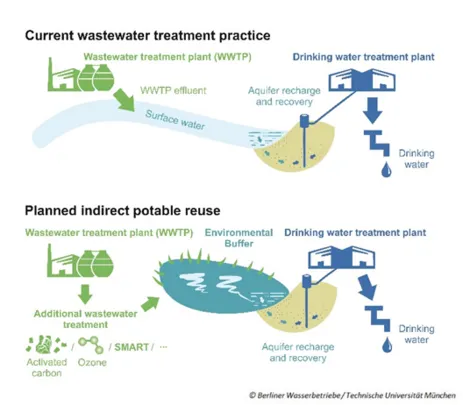TrinkWave: Development of a non-membrane based innovative treatment approach including comprehensive assessment criteria for indirect potable reuse in urban water cycles
Climate change, pollution and growing urban population are increasingly stressing urban water supplies. Higher proportions of treated wastewater in surface water can result in de facto potable reuse, which might present a condition of elevated risk to conventional drinking water treatment plants. The ‘TrinkWave’ project aims to develop new multi-barrier treatment processes for planned potable water reuse schemes. This new process will augment existing drinking water resources using recycled water while protecting public health and groundwater qualities.
With this in mind, energy-efficient natural treatment processes based on sequential managed aquifer recharge technology (SMART) will be developed within the "TrinkWave" research project, which provides impeccable drinking water quality without the use of high-pressure membranes. An important focus of potable reuse schemes is the inactivation of pathogens and antibiotic resistant genes and bacteria as well as the removal of health-relevant chemicals and organic micropollutants. The first large-scale application of this newly developed technology will be tested directly in collaboration with the Berliner Wasserbetriebe in Berlin as a preliminary stage of drinking water treatment. This treatment strategy has the potential to provide additional raw water for the drinking water treatment of the city and avoid contamination of groundwater aquifers through the impact from treated wastewater effluents.
Research goals of the TrinkWave project emphasize a holistic approach to the development, implementation and approval of different alterations of the proposed treatment processes (SMART 1.0 and 2.0), taking technical, legislative and societal aspects into account. In particular, the project will address the following topics:
- Identify current legislative conflicts between water management practices and groundwater protection requirements. Provide recommendations for the management of unplanned and planned potable water reuse practices in order to protect drinking water quality and public health;
- Develop a multidisciplinary water quality assessment framework for human health protection, with a special attention to quantitative risk management;
- Develop alternative process combinations comprised of technically modified hybrid filtration systems (SMART 1.0 and 2.0), which offer multiple barriers for microbial and chemical contaminants, a high level of groundwater protection, and a high degree of robustness and process reliability and efficiency;
- Develop technical guidelines and validation approaches to assure proper performance of multi-barrier systems;
- Develop and apply new chemical and genetic parameters to better assess microbial degradation of novel pollutants in SMART systems;
- Develop recommendations for action, as well as risk management and communication concepts with the goal of establishing sustainable potable water reuse schemes to augment future drinking water supplies.

